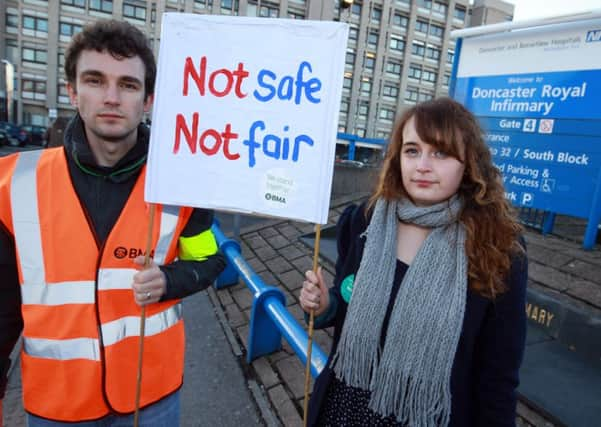YP Comment: How many lives have to be lost? Junior doctors go back on strike


It does not end here. Even though A&E cover is being maintained, the care and treatment of existing patients, including the seriously ill, will be hit by this strike paralysis in which both Ministers, and the health union, now stand guilty of intransigence.
This is too important to be left to brinkmanship because neither party wants to be the first to back down in case it is interpreted as an act of weakness – Jeremy Hunt, the Health Secretary, believes it will fatally compromise his plans to improve the care of patients in the evenings and at weekends while the BMA fears that it will lose credibility if it makes the first move.
Advertisement
Hide AdAdvertisement
Hide AdIt should not be like this. Even though Ministers are committed to transforming GP services after unveiling a new blueprint, an ageing population – and advances in medical science – mean hospitals are likely to face an even more onerous workload in the future. Without sufficient doctors and nurses, no shift pattern will work – irrespective of whether it is imposed by the Government or not. And no change to rota patterns will command the confidence of medical practitioners, and their patients, unless they have been proven to work.
In this regard, it is regrettable that the Government chose not to introduce its reform on a trial basis. Just because a discredited Labour party made this suggestion is no excuse for it being rejected out of hand – there should be no exclusivity on ideas when it comes to reforming key public services like the NHS. Just how many lives have to be put at risk, or lost, for the main protagonists to realise that they have taken this dispute too far?
Out of fashion: BHS pays the price on the high street
THE beleaguered chain BHS is not the first high street institution to see its finances implode. Nor is it likely to be the last – no store, however iconic, is immune from the retail revolution as long-established businesses find themselves competing with rivals whose online offering is just as important as their physical presence in major shopping centres.
This is no consolation to the 11,000 staff whose livelihoods are at risk after the troubled firm went into administration. For each and every one of these shop workers, the immediate priorities are two-fold – finding alternative employment if buyers cannot be found for specific stores and ensuring that their pension entitlements are protected.
Advertisement
Hide AdAdvertisement
Hide AdYet, leaving aside the “blame game” about who is at fault for the demise of this once great institution, it is clear that there are lessons to be learned for other stores who have taken their future for granted until now. The first is that BHS lost its way because it no longer had a raison d’être. In a consumer age, it did not offer once loyal customers sufficient reason to buy its clothes, or home products, over those sold by rivals like Marks & Spencer. Stores need a niche in order to stay in fashion.
Secondly, BHS was too slow to embrace new technology – and how increasingly discerning shoppers are more likely to make purchases online rather than in person. Because of this, BHS staff will now pay the biggest price of all with their jobs and livelihoods.
The duty of parents: Education does begin at home
FOR too long, the debate on education in Britain has focused almost exclusively on the quality of teachers in the country’s classrooms – and whether their professionalism is ticking enough boxes to meet the requirements of Ministers.
Yet it is important that this does not dilute, still further, the importance of parental responsibility; namely the duty of mothers and fathers to bring up their children responsibly rather than expecting the so-called “nanny state” to perform a surrogacy role for them.
Advertisement
Hide AdAdvertisement
Hide AdIt clearly concerns many families – nearly half of parents in Yorkshire fear their children will not be ready to start school at the age of five according to a survey by Action for Children. The results cannot be ignored. If youngsters do not know how to hold a pencil, or write their name, when they start their primary education, they are likely to struggle in later life.
For, while education does begin at home, a way has to be found to provide targeted help for those children whose parents, sadly, do not know better. If not, this region will remain rooted to the bottom of national league tables for attainment.